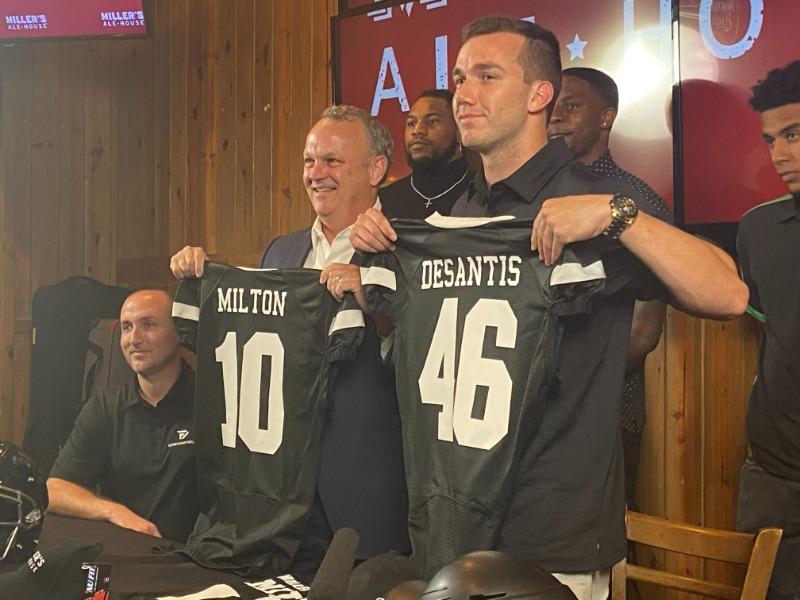Florida college athletes free to earn money off NIL


Florida State University quarterback McKenzie Milton, standing right, poses with a DeSantis jersey. [News Service of Florida]
The NCAA Board of Directors approved one of the biggest changes in the history of college athletics recently, clearing the way for nearly a half-million athletes to start earning money based on their fame and celebrity without fear of endangering their eligibility or putting their school in jeopardy of violating amateurism rules that have stood for decades.
In Florida, a law allowing athletes to receive off-the-field compensation took effect on July 1, after being signed last year by Gov. Ron DeSantis.
“This is an important day for college athletes since they all are now able to take advantage of name, image and likeness (NIL) opportunities,” NCAA President Mark Emmert said.
The move effectively suspends NCAA restrictions on payments to athletes for things such as sponsorship deals, online endorsements and personal appearances. it applies to all three divisions or some 460,000 athletes.
Florida State University quarterback McKenzie Milton wasted little time appearing at a Miller’s Ale House restaurant in Tallahassee on July 1 to sign a contract with Dreamfield, a company he co-founded with University of Miami quarterback D’Eriq King.
“This is bigger than any individual. It’s a day for all athletes to be able to capitalize on something they should have been able to a long time ago,” Milton said.
Dreamfield was developed with Florida’s new law in mind. Its objective is to allow businesses to book meet-and-greet events, photo shoots and athletic camps with college athletes, with the company handling compliance issues for the athletes.
The company’s website lists Milton and King as having $2,000-an-hour appearance fees.
“Our biggest focus is on safety and compliance,” Dreamfield CEO Luis Pardillo said Florida. “And that includes everything from NCAA compliance as well as team rules, everything that wraps into the Florida state law.”
The NCAA will also allow athletes to enter into agreements with agents, though all athletes are expected to keep their school informed of any and all NIL arrangements. The NCAA said schools are responsible “for determining whether those activities are consistent with state law.”
Anticipating the change, many schools already have plans in place, with some weaving NIL education into for-credit coursework.
Athletes must report NIL arrangements to their schools and there are limits on what they can do. Florida bars athletes from endorsing gambling.
For now, the NCAA has largely left the issue in the hands of more than 1,100 member schools.
“The current environment — both legal and legislative — prevents us from providing a more permanent solution and the level of detail student-athletes deserve,” Emmert said.
In a letter to member schools last week, Emmert stressed the high court still puts authority to govern college sports in the hands of the association. However, he warned schools that “existing and new rules are subject to antitrust analysis and we should expect continued litigation., particularly in the area of ‘play for pay.’”
The NCAA said the temporary policy addresses “play for pay” and the continued ban on improper inducements tied to choosing a school.
“The new policy preserves the fact college sports are not pay-for-play,” said Division II Presidents Council chair Sandra Jordan, chancellor at the University of South Carolina-Aiken. “It also reinforces key principles of fairness and integrity across the NCAA and maintains rules prohibiting improper recruiting inducements.”
The Associated Press and the News Service of Florida contributed to this report.





